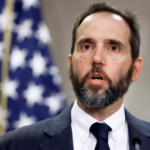Well, here we are. In one of the most jaw-dropping developments in modern American politics, President-elect Donald Trump is set to take office again, and the Justice Department finds itself in a tricky position. You’ve got career prosecutors who’ve spent months, if not years, building their cases against Trump, only to watch him win the election and put an end to the whole saga. Now, DOJ officials are scrambling to wind down the two federal criminal cases against Trump in line with the department’s long-standing policy: a sitting president can’t be prosecuted.
This wasn’t exactly what Special Counsel Jack Smith seemed to anticipate. Just weeks before Election Day, Smith was pursuing Trump with almost single-minded intensity. The DOJ plowed forward with its January 6 and classified documents cases as if the election calendar had zero bearing on the process.
Fast-forward to post-election reality, and suddenly, DOJ officials are all too aware of the limitations they face. Even if Trump had lost, these cases would have been bogged down, with appeals likely going all the way to the Supreme Court. However, with Trump set to take office again, these cases might never see a courtroom, and that’s a fact that the DOJ is grudgingly coming to terms with.
Former federal prosecutor Chuck Rosenberg summed it up with, “Sensible, inevitable, and unfortunate.” It’s probably all three, depending on who you ask. To Trump supporters, this development is a victory for justice and a rebuke to what they see as a politically weaponized DOJ. For his critics, this turn of events might feel like a gut punch, a signal that a president can sidestep accountability simply by winning an election. Joyce Vance, a former U.S. attorney, didn’t mince words, saying Trump had “avoided the quintessential part of American justice” by not facing a jury.
But if DOJ officials are reeling from the election’s outcome, Trump’s legal team is seizing the moment. They’re reportedly strategizing how to get every federal and state case against Trump dismissed or indefinitely postponed. The aim? Wipe the slate clean and eliminate all legal threats against the soon-to-be 47th president. One option they’re considering is pressing for case dismissals in Washington, which could prompt the DOJ to publicly clarify its reasons for dropping the case.
However, the legal roadblock isn’t entirely gone for Trump. In New York, he’s still facing a scheduled felony sentencing on November 26. His team’s goal is to push that off indefinitely or get it dismissed, and they’re working overtime to make it happen. Meanwhile, the Georgia election interference case is bogged down with appeals over ethical disputes, which could delay that case for who knows how long.
🚨BREAKING: Jack Smith’s prosecution is OVER:
“The DOJ, where Jack Smith works, cannot prosecute a sitting president… Fox News is told that Jack Smith will be gone from his post as special counsel, meaning the cases will be gone before Trump takes the oath of office on January… pic.twitter.com/Gu6u56E0gj
— Charlie Kirk (@charliekirk11) November 6, 2024
But here’s the thing: Trump’s win signals more than just a return to the White House. His supporters view it as a rebuke to the so-called “weaponization” of the justice system, and they’re not wrong to say that voters have spoken loud and clear. According to a statement from Trump campaign spokesman Steven Cheung, Trump has received “an overwhelming mandate to Make America Great Again,” and people want “an immediate end to the weaponization of our justice system.” For many Americans, this victory isn’t just about Trump—it’s about putting a stop to what they see as a political machine disguised as justice.
And let’s be real here—the DOJ’s own policy dates back to a 2000 memo affirming that a sitting president can’t be indicted, a concept that emerged from Watergate. The logic was that prosecution would “unduly interfere” with presidential duties. And in the current climate, with a deeply divided electorate, that legal precedent is more relevant than ever.
JUST IN: The Department of Justice and Jack Smith immediately end their cases against Donald Trump.
The DOJ cited their policy that presidents can’t be prosecuted however it was assumed they would work up until the “last day.”
“What’s interesting here is that the DOJ is moving… pic.twitter.com/TzOKIxSgcF
— Collin Rugg (@CollinRugg) November 6, 2024
The reality is that these cases were unprecedented, but so is Trump’s comeback. For now, it appears that justice, at least in the criminal court sense, will be deferred. Whether or not that’s a flaw in our justice system or a testament to Trump’s resilience depends on which side of the aisle you sit on. But for Trump supporters, this isn’t just a legal victory—it’s the sound of justice in what many feel was a witch hunt to begin with.








